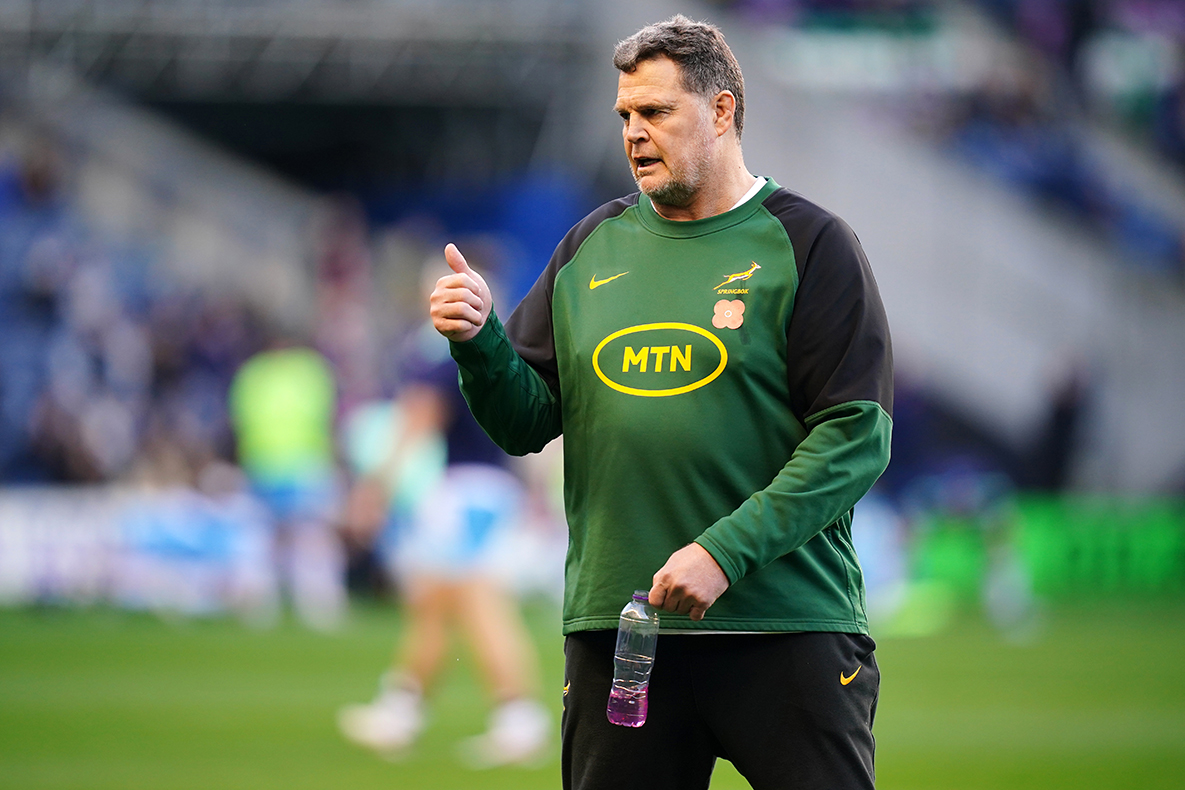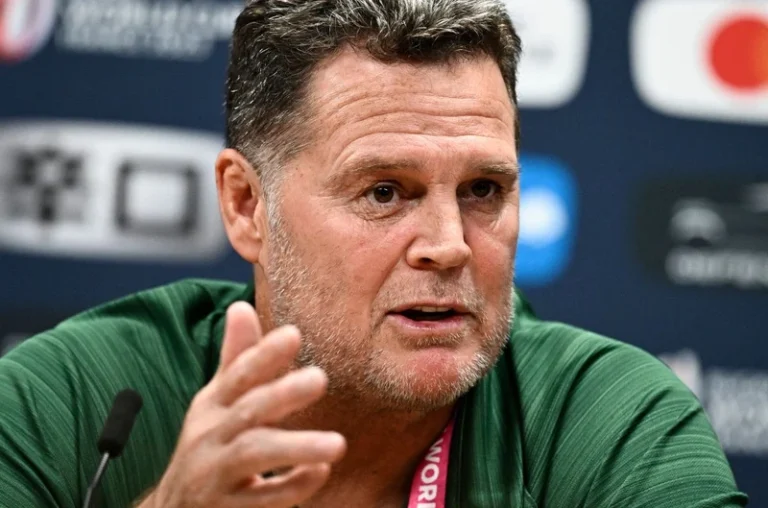SARU faces a crucial decision as local and foreign investor vie for control
Johan “Rassie” Erasmus, the Springboks coach, gestures as he speaks at The Supersport Studios in Johannesburg on March 1, 2018. SARU’s investment environment is getting murkier after the union rejected an investment deal from ASG
Johan “Rassie” Erasmus, the Springboks coach, gestures as he speaks at The Supersport Studios in Johannesburg on March 1, 2018. SARU’s investment environment is getting murkier after the union rejected an investment deal from ASG / Gulshan Khan/AFP via Getty Images.
The South African Rugby Union (SARU) finds itself in a challenging position after rejecting a $75 million investment from Ackerley Sports Group (ASG) in the United States. This deal would have allowed ASG to acquire 20% of SARU’s commercial rights firm, but it failed to receive the 75% approval needed from SARU’s 13 unions, with seven votes against it.

SARU President Mark Alexander acknowledged the unions’ concerns but emphasized that financial stability is essential. He stated, “Our goal remains to secure a sustainable and prosperous future for South African Rugby.” Alexander assured that SARU would maintain transparency in their plans and explore new proposals that align with a united vision before ASG’s exclusive timeframe expires later this month.
The investment was viewed as an opportunity to bolster South African rugby’s financial standing. SARU had promoted it as not only providing immediate cash but also essential expertise, networks, and resources to enhance the commercial value of the sport in South Africa, asserting, “A private equity partnership offers not just an immediate financial boost but also crucially provides the expertise, networks, and resources necessary to enhance the commercial value of South African rugby.”
In light of skepticism surrounding ASG’s offer, local investors are emerging with an alternative. Billionaire Johann Rupert, together with the owners of prominent teams like the Bulls, Sharks, and Stormers, has proposed a rival deal worth $372 million for up to 40% of SARU’s commercial rights. This plan aims to retain control within South Africa while addressing financial challenges without introducing complications or excessive fees.
Concerns have also been voiced by former Springbok Schalk Burger Sr., who highlighted the need for support for smaller unions: “For us, it’s about SA Rugby and the small teams. How do they get help in the future? It’s going to be a big week ahead.”
Moving forward, SARU faces a significant decision: whether to accept ASG’s revised proposal or pursue the local investment plan. As Alexander noted, the outcome of this choice will greatly impact South African rugby’s financial health and strategic direction both now and in the future. McGluwa underscored the seriousness of the situation, saying, “Any deal can seem good but must be truly right.”
The South African Rugby Union (SARU) is currently under substantial pressure as influential figures in rugby are proposing an alternative to the much-discussed financial arrangement with Ackerley Sports Group (ASG) from the USA.
This ASG deal, valued at $75 million (approximately R1.3 billion), has faced considerable criticism for being financially complex, lacking secure funding, and containing high commission fees, all of which have led to notable resistance from various stakeholders.
Prominent benefactor Johann Rupert, along with Marco Masotti and Johan le Roux—who hold ownership stakes in the Bulls, Sharks, and Stormers, respectively—are championing a competing proposal spearheaded by local investors.
Ex-Springbok Schalk Burger Sr., who is involved with the Boland Rugby Company and advocates for smaller teams, emphasized the significance of the coming week for South African rugby. “For us, it’s about SA Rugby and the small teams. How do they get help in the future? It’s going to be a big week ahead. A key week for SA Rugby,” Burger stated to Rapport, underscoring the urgency of the situation.
Furthermore, this new proposal urges SARU to engage a top-tier financial firm to assess its financial needs and establish a temporary funding strategy to address pressing issues. Initially slated for a decision in October, SARU postponed the vote on the ASG deal at the behest of Sports Minister Gayton McKenzie, who requested more information. To approve the deal, SARU now requires a 75% consensus—10 out of 13 provincial unions must be in favor.
Simultaneously, the Portfolio Committee on Sports, Arts, and Culture is intensifying its scrutiny of SARU’s operations. Chairperson Joe McGluwa remarked that SARU is expected to brief the committee on December 4 regarding ongoing concerns. “We have seen too much guessing and wrong facts,” McGluwa observed. “SARU should trust us as a committee; we cannot let surprises hit our nation.”
The ASG proposal permits American investors to acquire 20% of SARU’s commercial rights company. Advocates argue that the $75 million injection could significantly bolster the financial landscape of rugby, while skeptics approach ASG’s monetary assurances with caution.
With the unions divided and a locally sourced offer now on the table, SARU faces a pivotal decision in the near future. “Any deal can seem good but must be truly right,” McGluwa pointed out, reflecting the gravity of the choice at hand.
This week is indeed critical. SARU will determine whether to proceed with ASG’s proposal or embrace a homegrown solution that may profoundly impact the future of South African rugby.
